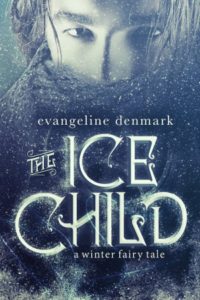The latest from fantasy writer Evangeline Denmark is the fairy tale novelette The Ice Child. A clockmaker’s apprentice named Sipp dreams of opening his own shop, until another destiny calls to him. In this Q&A, Evangeline talks about what makes Sipp unique, why fantasy isn’t just “dragons and epic quests,” and why fairy tales have enduring significance…
By Brock Eastman
How did you come up with the idea for this novelette?
This story came out of some world-building I did for my novel, Curio, although there aren’t any discernable links to that book. It was just my imagination following a path that sprang up as I did background work.
What makes your main character Sipp, unique?
Sipp is a clockmaker’s apprentice, an orphan, and an outcast due to a strange mark he bears. He also had an incredible talent that he hides.
What three words describe this story?
Creativity. Prejudice. Acceptance.
How do you believe this story relates to the lives of readers?
I think we’re all tugged toward some creative pursuit, but it’s easier for some to pursue it than others. Sipp is afraid of the exposure his talent will bring because of cruel way he’s been treated by the townspeople. I hope that readers will feel emboldened to pursue whatever art beats away inside of them, and that they’ll give space and appreciation to others attempting to do the same.
What’s your favorite genre to write?
If I say fantasy, people automatically think of dragons and epic quests, and that’s not really what I do. But everything I write falls under the Fantasy umbrella. I just haven’t figured out the correct label. Supernatural? Paranormal? Magical? Out-of-the-box weirdness?
Any certain research required for the book, or is it all from your imagination?
 Since this story is set in Martigny Switzerland in the 18th Century, I did have to do some research into what that region was like during that time period. I purposefully left the timing open because guilds are featured in the story, and they were in decline toward the end of that century.
Since this story is set in Martigny Switzerland in the 18th Century, I did have to do some research into what that region was like during that time period. I purposefully left the timing open because guilds are featured in the story, and they were in decline toward the end of that century.
The Ice Child is based on a fairy tale. Why do you think fairy tales have enduring significance?
Fairy tales deal with problems and fears that we wrestle with as humans. That’s why we find versions of the same story in many different cultures. They’re breadcrumbs (yes, Hansel and Gretel reference intended) along our trail to confronting problems like injustice and fear of the unknown.
The Ice Child folktales attempt to explain away infidelity and always involve the wife telling a lie and the husband getting rid of a child he doesn’t want. Awful, right? With my story, I wanted to focus on that unwanted child and extend the conversation to include the incredible value of each individual.



